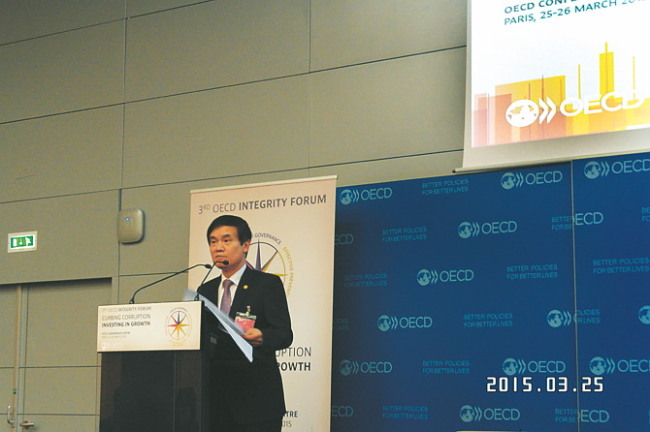ACRC chief promotes Korea’s antigraft policies at OECD forum
By Yoon Min-sikPublished : March 26, 2015 - 20:33
The chief of South Korea’s anticorruption body shared the country’s efforts to root out corruption at the OECD Integrity Forum Wednesday, highlighting the recent passage of the anticorruption act.
Lee Sung-bo, chairman of the Anti-Corruption and Civil Rights Commission, explained the contents of “The Act on the Prohibition of Improper Solicitations and the Offer and Acceptance of Money, Gifts, etc.” and its effects on Korean society.
Lee Sung-bo, chairman of the Anti-Corruption and Civil Rights Commission, explained the contents of “The Act on the Prohibition of Improper Solicitations and the Offer and Acceptance of Money, Gifts, etc.” and its effects on Korean society.

“Korea achieved rapid economic growth and political democratization at the same time. ... Despite these achievements, outdated culture and practices, especially corruption caused by nepotism and favoritism, have been obstacles to Korea’s sustainable growth and development,” Lee said in his opening speech at the forum held in Paris.
While the government has been implementing measures to fight corruption, they were not strong enough to eradicate “corruption-causing culture and practices” in Korea, he said.
Lee stressed that the new act will help get rid of such social and cultural practices that cause corruption.
The antigraft act proposes criminal punishment for public officials who receive money, products or services that reach or exceed 1 million won ($906) in value. It was recently passed at both the National Assembly and the Cabinet meeting and currently awaits ratification by President Park Geun-hye.
The act, stuck in limbo since its inception in 2012, rose to prominence again after last year’s ferry accident in April that left over 300 dead or missing. A network of corruption involving government and private sector sparked public furor, and the act received a much-needed boost.
“No other anticorruption law has received such huge support from the Korean public and keen attention from the international community as this new act,” Lee pointed out.
Under the definition of the act, “improper solicitations” would be requesting a public official to handle services or duties on 15 types of public services and duties ― stipulated by the act ― by violating laws or exercising said official’s influence beyond one’s authority.
The services and duties include authorization and permission, administrative measures and criminal sanctions, personnel affairs of civil servants, public contracts, resource distribution and evaluation. The act will punish both the provider and receiver of bribes.
In the course of finally getting parliamentary approval, the scope of the act was expanded to include media and private school teachers and stirred dispute of being unconstitutional.
Following such concerns, the ACRC has vowed to use ordinance and regulations to address the problems that may occur prior to its official implementation in October 2016.
Lee said while some people may view the act as radical, its aim is not to pursue changes within the “existing corruption-prone culture and practices,” but to “fundamentally redesign the framework of Korean culture and practices that cause corruption.”
In addition to the act, the ACRC is currently working on the enactment of the ministerial code of conduct, a bill to prevent false claims on public finances and revising an act on protection of whistle-blowers to encourage more anonymous reporting of corruption.
Lee’s speech was in response to a request by OECD Secretary-General Angel Gurria to introduce the new act, ACRC officials said. Other participants included French Foreign Trade Minister Matthias Fekl, director general of the European antifraud agency OLAF Giovanni Kessler, Peru’s comptroller general Fuad Khoury Zarzar and Raffaele Cantone, the head of Italy’s national anticorruption authority.
After the forum, Lee will head to London to host the second session of the Korea-U.K. Anti-Corruption Seminar on Friday where officials from ACRC and experts from the U.K. Justice Ministry and British Standards Institution will discuss antigraft measures of both countries.
By Yoon Min-sik (minsikyoon@heraldcorp.com)


![[Exclusive] Korean military set to ban iPhones over 'security' concerns](http://res.heraldm.com/phpwas/restmb_idxmake.php?idx=644&simg=/content/image/2024/04/23/20240423050599_0.jpg&u=20240423183955)

![[Graphic News] 77% of young Koreans still financially dependent](http://res.heraldm.com/phpwas/restmb_idxmake.php?idx=644&simg=/content/image/2024/04/22/20240422050762_0.gif&u=)



![[Pressure points] Leggings in public: Fashion statement or social faux pas?](http://res.heraldm.com/phpwas/restmb_idxmake.php?idx=644&simg=/content/image/2024/04/23/20240423050669_0.jpg&u=)










